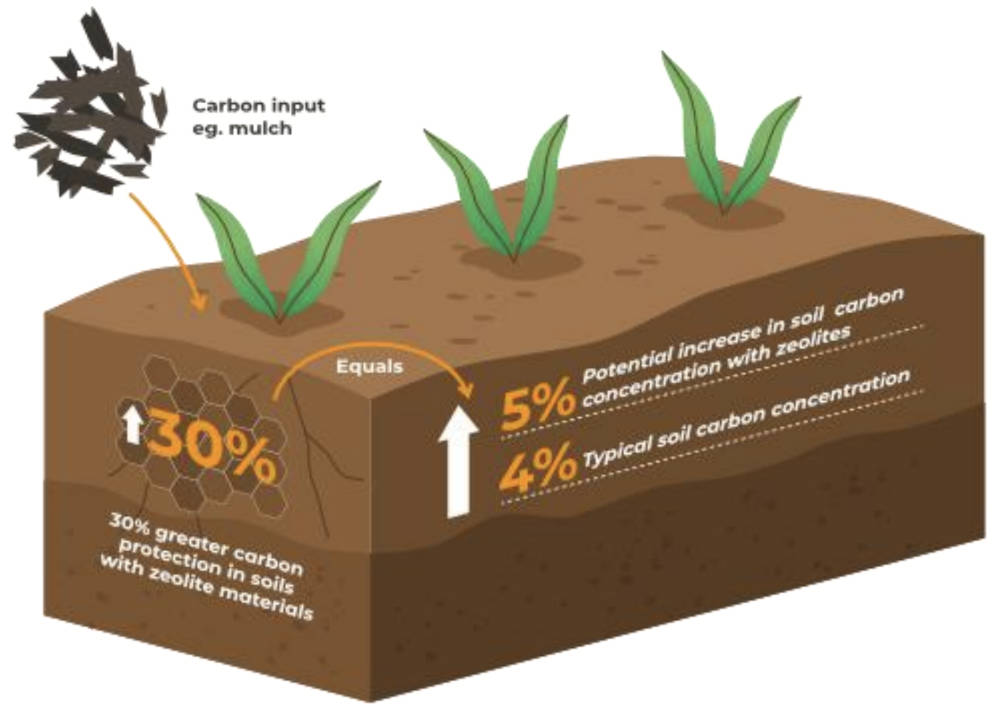Sow, sequester, save: Zeotech’s zeolites show promise in crop growth and carbon capture

Plant growth and organic carbon protection were both improved by the application of Zeotech’s zeolite agri-soil product. Pic: Getty Images.
- Zeotech’s zeolite agri-soil product found to increase organic carbon protection by ~30%
- Product also displays promising performance in reducing nutrient leaching and improving plant growth
- Engagement ongoing with industry participants to advance field testing and agri-soil product development initiatives.
Special Report: Zeotech’s manufactured zeolite agri-soil product enhances the efficiency of fertiliser application, according to a research program at Griffith University.
The program also found that the zeolite product had considerable potential to sequester organic and inorganic soil carbon, which removes CO2 from the atmosphere.
Zeolites – also known as molecular sieves – are manufactured porous mineral frameworks composed mainly of aluminium, silicon, and oxygen that can trap, exchange, or release ions and molecules.
Zeotech (ASX:ZEO) has been testing the use of zeolites to reduce methane emissions from landfills, prevent milk fever in cows, and improving fertiliser delivery economics while enhancing and protecting soil carbon.
The last led the company to launch the program at Griffith University in November 2021 to establish scientific validation of its agri-products.
Initial results resulted in the lodging of a ‘Method and Use of Zeolites’ patent application on 21 August 2023, associated with carbon sequestration in soils using the company’s zeolite-based products.

Impact of zeolite materials protecting 30% more carbon added to soils, than soils with no zeolites. Pic: Zeotech
Soil carbon improvement
Datasets established across multiple experiments, ranging from small-scale incubations containing soils only, through to the recent larger-scale five-month plant growth trials confirmed that the addition of manufactured zeolites to soils has the potential to significantly boost soil carbon sequestration.
Results from recent trials to evaluate the capacity of the zeolites to sequester soil organic carbon in the presence of plants compared well with previous carbon incubation trials (without plants).
The latest test found that zeolites protect 30% more carbon added to soils in the form of mulch than soils receiving added carbon with no zeolites.
This could represent significant amounts of additional carbon sequestration as a typical soil with 4% initial soil carbon concentration would equate to an increase of 5% carbon, which results in additional carbon sequestration of 160t of CO2 equivalent per hectare.
Such results confirm the ability of high surface area minerals, like zeolite, to offer good prospects for meaningful long-term soil organic carbon sequestration.
While the treated soils have lower inorganic carbon (carbonate) stocks than organic carbon, it still represents an important carbon pool in regulating the global climate compared to soil without added zeolites.
Nutrient management success
Several low-cost zeolite granule formulations developed under the program that were deemed suitable for application in agricultural settings were blended with commercial fertiliser by being ‘soaked’ in the commercial fertiliser that has been dissolved in water and subject to nutrient leach testing.
This liquid sorption compound returned promising results, by exhibiting lower leached nutrient concentrations compared with conventional chemical fertiliser – an indicator that zeolite-fertiliser compounds provide a more efficient release mechanism for nutrients over a longer period.
During plant growth agronomic trials, the liquid zeolite fertiliser compounds returned promising performance both in terms of nutrient leaching and plant growth in the agronomic trials.
The manufactured zeolites were also found to be very effective at removing a range of pesticide compounds that are commonly used in agriculture, such as glyphosate, carbaryl and penthiopyrad from solution.
Across a range of concentrations and dose rates tested, the materials achieved more than 60% removal on average, and for carbaryl, achieved 100% removal, demonstrating a capacity to regulate pesticide compounds.
This indicates that zeolites could be used in drainage systems on farms to intercept, and in some instances break-down harmful pesticides.
“The overall outcome of Zeotech’s agri-soil program has delivered compelling results and noel soil carbon pathways. Achieving organic carbon protection of around 30% in soils compared with controls, combined with high nutrient carrying capacity and enhanced nutrient efficiency are exciting findings,” Griffith University’s Dr Chris Pratt said.
“The positive results increase confidence that broader in-field trials are warranted to validate that Zeotech’s agricultural soil products can contribute towards improving on-farm economics, environmental outcomes and offer potential solutions to rural communities for the transition required to meet Australia’s commitment to net zero emissions by 2050.”
ZEO chief executive officer Scott Burkhart added the results validated the potential of the company’s agri-soil product to promote soil carbon sequestration.
“We are very excited to continue our engagement with industry participants following the receipt of the final published report and advance opportunities across product development and field testing,” he added.
Next steps
The company has initiated engagement with fertiliser industry participants to leverage the datasets generated throughout the program to attract an industry partner.
Along with industry, ZEO aims to advance the next stage of field testing and agri-soil product development, that could potentially include a large-scale glasshouse trial and/or on farm trials at an agricultural site, as recommended within the report.
This article was developed in collaboration with Zeotech, a Stockhead advertiser at the time of publishing.
This article does not constitute financial product advice. You should consider obtaining independent advice beformaking any financial decisions.
Related Topics
UNLOCK INSIGHTS
Discover the untold stories of emerging ASX stocks.
Daily news and expert analysis, it's free to subscribe.
By proceeding, you confirm you understand that we handle personal information in accordance with our Privacy Policy.








